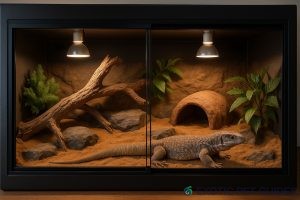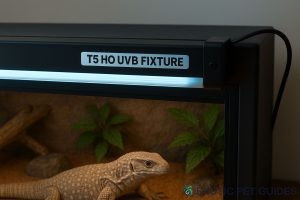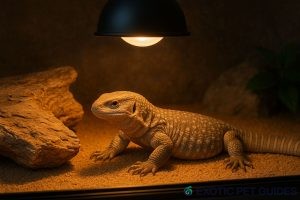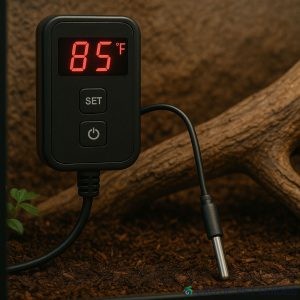Introduction
Keeping a Savannah Monitor healthy and thriving begins with the right equipment. These powerful, active lizards need more than just a basic tank and heat lamp. In this guide, we’ll recommend the best enclosures, lighting systems, heating tools, and substrates—based on expert reviews and keeper feedback from 2025.
1. Enclosure: Spacious and Secure
Savannah Monitors require a minimum of 8ft x 4ft x 4ft as adults. For beginners or juvenile monitors, you can start smaller but plan for rapid upgrades.
✅ Top Pick – Custom PVC Reptile Enclosure (8x4x4) by Zen Habitats
- Modular design
- Excellent ventilation
- Easy to maintain

2. UVB Lighting: Essential for Bone Health
They need high-output 10.0–14.0 UVB lighting to prevent MBD.
✅ Recommended – Arcadia T5 HO 14% UVB Kit
- Covers a wide area
- High UVB output for large monitors
- Long-lasting bulbs

3. Heat Lamps & Basking
Savannah Monitors require a basking spot of 120–140°F. You’ll need strong basking lamps and a thermostat.
✅ Best Combo – Zoo Med PowerSun UV + Ceramic Heat Emitter (CHE)
- Day/night heat control
- Deep-penetrating infrared heat
- Pairs well with a thermostat

4. Thermostats & Temperature Monitoring
To prevent burns or cold zones, use a reliable thermostat and multiple digital thermometers.
✅ Top Thermostat – Inkbird ITC-306T
- Dual outlets for day/night control
- Accurate digital readout
- Affordable and reliable

5. Substrate: Digging & Burrowing
Savannah Monitors love to dig. Choose a deep, moisture-retentive substrate like a mix of:
- Organic topsoil
- Play sand
- Coconut fiber
✅ Best Substrate Mix – The BioDude Terra Sahara + Play Sand

6. Hides, Water Dish & Enrichment
They need:
- Multiple hides (hot/cool sides)
- A large water dish for soaking
- Branches or rocks for climbing
✅ Favorites:
- Reptile Basics XL Hide
- Fluker’s Extra Large Water Bowl
- Mopani wood & basking rocks

Conclusion
Savannah Monitors are large, demanding reptiles, but with the right setup, they can thrive in captivity. Prioritize space, heat, UVB, and substrate—and always monitor their environment carefully. Investing in quality equipment up front can prevent costly health issues later.